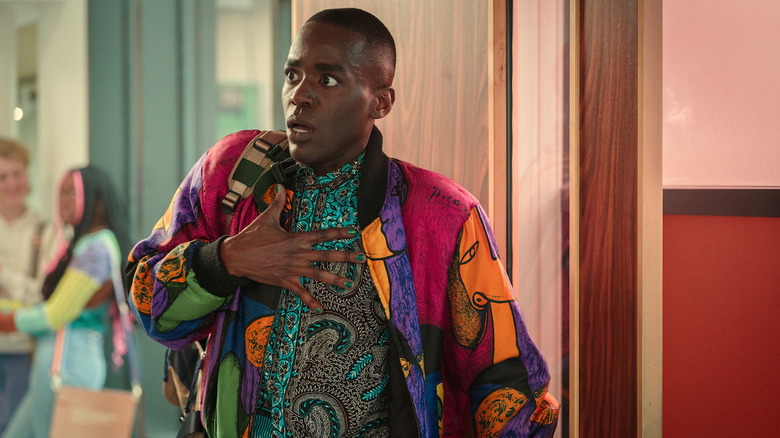Sex Education Season 4 Review: School's Out Forever
- Surprisingly effective in developing its adult characters, in contrast with prior seasons
- Spreads itself too thin, giving too many characters dramatic storylines it fails to explore in-depth
- New characters aren't given space in the ensemble
- The overarching sex therapist election plot is dead on arrival
The oldest high school students on television are back, and this tired fourth and final season is conclusive evidence that they should have graduated some time ago. Although a consistent streaming smash, "Sex Education" has worn its initial premise too far into the ground since premiering in 2019, never properly finding the balance between a sitcom exploring adolescent sexual dysfunction and a more conventional high school drama.
The first — and still the best — season is a modern, distinctively British riff on teen movie tropes popularized by John Hughes, each episode driven by a different character's bedroom conundrum as bumbling sex therapist Otis (Asa Butterfield) aims to help others while struggling to navigate his own anxieties. But many members of that supporting cast quickly became fan favorites, bumped up to series regular status thereafter, and further seasons have buckled under the weight of just how sprawling this ensemble is; many should-be powerful storylines land without impact as they're given little room to breathe.
Did none of the writers remember what happened in Season 3?
Add onto this a continued determination to ensure that no sexual experience teenagers may face isn't depicted in some capacity, and the show's characters now don't appear to have a life outside of their respective narratives. There's no time for anything that could deepen their characterization, unless it also helps propel the series toward its end. This is especially disappointing considering the series fails to give rich characters like Eric (Ncuti Gatwa) the send-offs they need; Eric's plot this season, struggling to navigate his sexuality with his Christian faith, stumbles because his faith only comes into focus when the narrative depends on it. By the halfway point, when that plot directly transforms into high-concept fantasy, I got the sense the writers had no idea how to do justice to such a weighty topic.
But that is still a relative high point in the season when compared to the dismal overlapping storyline. At the end of Season 3, Moordale Secondary School closed for good, with all students told to find somewhere else to complete their final semester of studies before heading off to university. Now at a neighboring school, Otis aims to resume his position as sex therapist only to discover that — shock! — they have a sex therapist of their own, the mysterious Scot O (Thaddea Graham), who is considerably more knowledgeable and personable than the awkward teen. Soon, a battle breaks out to see who will be named the school's definitive therapist, an ongoing narrative until the final episode, even though it has no stakes upon arrival. Weren't we just told at the end of the previous season that they'll be leaving school soon? Why should we care about who gets to be the school's sex therapist for a few weeks? By the final episode, it seems like even the writers agree with me: When a teacher calls the whole debacle a "waste of time," it's hard not to nod in agreement.
When watched immediately after Season 3, this only raises more questions than it answers. I'm not one to poke at plot holes, but come on, the last school got closed after getting a reputation for being the "sex school" in the press — how is this school where the students express similarly unashamed sexuality not getting a similar rep, especially when it has support from the teachers? Although speaking of the teachers, it's genuinely unexpected that one of the few successful storylines this time around belongs to the reserved former headteacher Michael (Alistair Petrie), whose overlapping arc about moving on from his marriage is developed more than the teen characters' stories at the center. That a teen drama is most accomplished in the writing of a middle-aged man is probably a sign that, after four seasons, many of its characters haven't gone through the growth they need to be able to sustain more intense plotlines; they've remained one-note in their seemingly never-ending adolescence.
Sex Education does its characters dirty
This one-note nature is also apparent in its new, sexually frank teen characters, who are granted thin storylines that mistake referencing certain aspects of their identity for meaningfully depicting them. Take trans man Roman (Felix Mufti), a charismatic Scouse teen who is granted only a single moment of introspection across all eight episodes despite being a central figure. Outside a nightclub, he talks to returning character Cal (Dua Saleh) about his top surgery, but the dialogue oddly doesn't feel lived-in despite being delivered by a trans actor with a personal connection to it. Instead, we get a clumsily written sequence that simply states medical facts and stops the drama in its tracks. It's one of many scenes this season that feels designed simply to be taken out of context to troll right-wing Twitter — ensuring that anybody dunking on the scene would have to listen to the medical facts within it before they do so. But it fails to make this feel authentic to the characters themselves, instead coming across like an educational PSA smuggled in.
In fact, this season is remarkable in just how little it cares about offering depth to any issues relating to sexuality or gender. Cal is having an adverse effect to taking testosterone for the first time, for example, which pivots into a half-baked mystery rather than carefully integrating any of the reasons behind this into the narrative itself. And then there are the individual case studies that open each episode; stand-up comedian Hannah Gadsby, who plays the producer of Jean Milburn's (Gillian Anderson) new sex advice radio show, is gifted a comic set piece in which their character uses chili oil in place of lube. Despite opening an episode, it's more than 20 minutes before anybody makes another reference to it, and it has no dramatic or comedic payoff. It's the most damning sign that the writers have run out of medical conditions to diagnose their characters with.
I understand that I'm not the target audience for "Sex Education" and that any flaws in the writing will be overlooked by a Gen Z audience who are happy their faves are gracing the screen one last time. But put it this way: elsewhere this season, there are plotlines about cancer scares, abusive boyfriends, long-distance relationships, and struggles to find closure after sexual assault and the deaths of parents. When none of these are given the room to breathe within the drama, meaning I can't even analyze them with any depth in the review itself, it's a sign the show is spreading itself too thin to properly do justice to the struggles its characters face. It's a relief the school bell is ringing for the final time.
"Sex Education" Season 4 is now streaming on Netflix.


